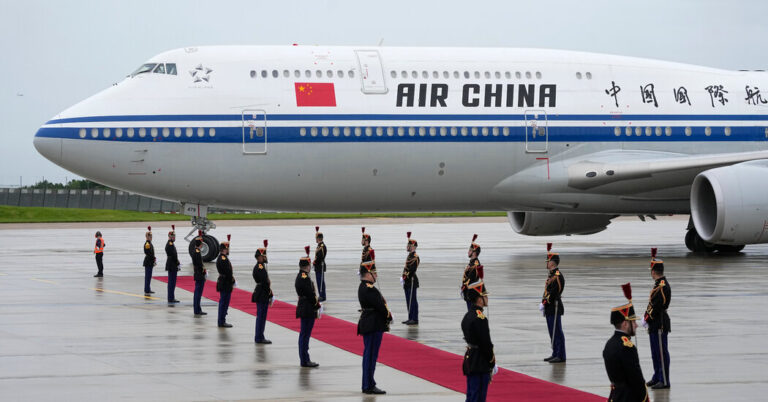This week, for the first time in five years, Chinese President Xi Jinping is traveling to Europe, with stops in France, Serbia and Hungary.
Mr. Xi’s trip comes at a time of tensions with many European countries over China’s support for Russia over its war in Ukraine, its trade practices and its apparent espionage activities. The trip will also test Europe’s capabilities a delicate balancing act between China and the United States.
Mr. Xi hopes to avoid a trade war with the European Union as frictions mount over Chinese electric vehicle exports and diminishing market access for European companies in China. Mr Xi will also encourage French President Emmanuel Macron to seek greater autonomy from the United States in a bid to weaken Washington’s global dominance.
Here’s what we know about Xi’s trip, which began on Sunday.
What is the significance of Xi’s itinerary?
The three countries that Mr. Xi will visit, experts say, to varying degrees, embrace China’s efforts towards a redefined world order. All have, to some extent, challenged the American post-war world order and wanting to strengthen ties with Beijing.
Hungary has close ties with China and is keen to attract Chinese investment in areas such as Electric car And battery manufacturing as Chinese producers expand beyond Asia. Serbia too enjoys warm relations with Beijing and has secured billions of dollars in Chinese investment.
Mr. Xi’s first stop is France, where Mr. Macron recently declared that Europe “must never be a vassal of the United States” and presented France as a bridge between the “global South” and the powers Western.
Despite his relations with Beijing, Mr. Macron said he was still closer to its ally, the United States, than to China.
“I prefer to choose my relationship with the United States, with China, rather than having it imposed on me by one of the two parties, either by pushing me in one direction or by dragging me in the other,” did he declare. a meeting with The Economist magazine. But he added: “Quite clearly we are not equidistant. We are the allies of the Americans.”
Ahead of Xi’s visit, Chinese diplomats expressed hope that ties between France and China would be at the forefront of China’s relations with the West.
Ursula von der Leyen, president of the European Commission, the EU’s executive branch, joined the negotiations Monday with Mr. Xi and Mr. Macron in Paris.
This year is also symbolic for China and the three countries.
It is the 60th anniversary of diplomatic relations between China and France and the 75th of those with Hungary.
This year also marks the 25th anniversary of NATO’s bombing of the Chinese embassy in Belgrade, Serbia, during the Kosovo War, which killed three Chinese journalists and sparked angry protests outside the US embassy in Beijing. Chinese officials have continued to point to the bombing as a sign of NATO aggression and as an example of why Russia was right to feel threatened before deciding to invade Ukraine.
When was Xi’s last visit to Europe?
Mr Xi’s last European visit was in 2019, before the coronavirus pandemic, where he took refuge in China, leaving the country’s borders for the first time since the start of the year. fall 2022.
The 2019 trip included a flashy ceremony in Rome to celebrate Italy’s participation in China’s Belt and Road global infrastructure project, which aims to expand China’s influence overseas. France rolled out the red carpet for Mr. Xi in Paris and signed more than a dozen trade and government treaties worth billions of euros, even as Mr. Macron warned that “China is playing on our divisions” and that “the period of European naivety is over.”
Mr. Xi too visited Greecewhere he pledged his support to the country in its fight with Britain to obtain the Parthenon sculptures known as Elgin Marbles.
How are relations between Europe and China going?
Since Mr. Xi’s last visit, the divide has widened in relations between China and much of Europe. THE corona virus pandemicBeijing’s embrace of Russia and its repression of ethnic minorities, as well as the rise of Chinese exports, have generated backlash against China in many European countries.
China has quintuplet car shipments in foreign markets in recent years, and the European Union has recently adopted a more confrontational tone toward China’s trade practices. EU authorities have opened an investigation that could result in limiting Chinese solar exports and have taken preliminary steps to restrict trade with Chinese products, including electric cars, wind turbines and medical devices.
Italy has also told China it will no longer participate in its Belt and Road Initiative, and last month six people in Europe were charged with spying for China in the process. space of a week, a sign that European countries intensify their response to Chinese espionage.
At the same time, European countries have divergent views on how to engage with Beijing and benefit from the economic opportunities offered there, and some fear the imposition of European tariffs.
Mr. Macron and Chancellor Olaf Scholz of Germany I also believe that China’s influence will be key to ending the war in Ukraine.
David Pierson contributed to reporting from Hong Kong, and Aurélien Breeden from Paris.


